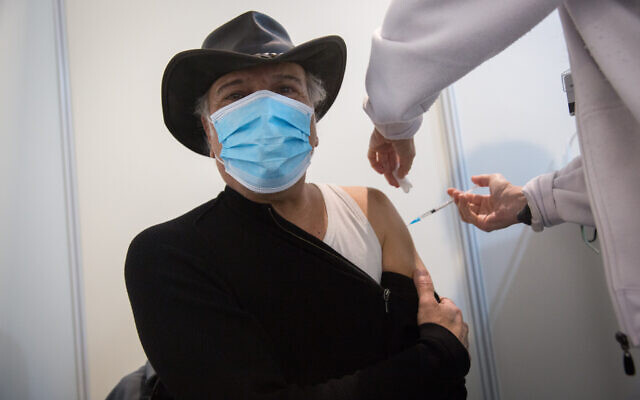The Health Ministry on Tuesday advised pregnant women to get the coronavirus vaccine after a number of women expecting a baby fell seriously ill with COVID-19, sparking concerns.
“There is no evidence of harm resulting from vaccination during the entire pregnancy,” the Health Ministry said in a statement that also included a warning.
“In pregnant women who become infected and fall ill with the coronavirus, there is a higher incidence of a severe onset of the disease, than in a similar age population,” the ministry said.
Pregnant women who choose to be vaccinated can do so through their health maintenance organization, the ministry said.
Ten pregnant women have become seriously ill and hospitalized in recent days due to coronavirus infections, according to Hebrew media reports.
Their babies were delivered prematurely via Caesarean section procedures due to life-threatening risks to the mothers and the children, the reports said.
Some of the women are suspected of having been infected with the so-called British strain of the coronavirus, a mutated strain that is believed to be more infectious, though not considered more deadly.
Due to the incidences of pregnant women becoming seriously ill, Health Ministry Director-General Chezy Levy consulted with the National Council for Women’s Diseases and Fertility and an official committee that decides on prioritization for vaccinations.
The priority committee gave its approval for pregnant women of all ages to get the vaccine that has so far only been available to medical workers, those over the age of 45, and at-risk groups.
The committee recommended vaccinations for pregnant women who are regularly exposed to the public or who have medical conditions, while other expecting mothers can decide for themselves what to do based on Health Ministry advisories.

An Israeli man receives a COVID-19 vaccine, at a vaccination center operated by the Tel Aviv Municipality with Tel Aviv Sourasky Medical Center (Ichilov), at Rabin Square in Tel Aviv, January 19, 2021. (Miriam Alster/Flash90)
In its Tuesday statement, the Health Ministry stressed that experts have assessed that “there is no biological mechanism that explains the possibility of harm to the mother or fetus.”
The ministry added that women who were vaccinated while unaware that they were pregnant did not have more irregular developments during the pregnancy than those who were not vaccinated.
Clinical trials for the Pfizer-BioNTech vaccine that Israel is using for its mass vaccination campaign did not include pregnant or lactating women and the companies have said there was insufficient data to show if there is any risk involved.
That led authorities in some countries to exclude pregnant women and breastfeeding mothers from their vaccination programs, including in Israel.
After the ten pregnant women were hospitalized recently with the virus — four in the past week — the Health Ministry ordered that all of them be tested to see if they were infected with the British strain, or another mutation detected in South Africa, the Kan public broadcaster reported Tuesday.
Samples were sent to the Health Ministry’s central laboratory and initial results show that at least three of them have the British strain, the Ynet website reported. Final results will become available in the coming days.
Health officials have said there is no evidence so far that the standard coronavirus vaccination does not also work on the British strain, but there is concern that its arrival in the country is driving infection rates up even as the vaccination program speeds ahead. Monitoring groups assess that Israel has by far the highest number of vaccinations per capita in the world.

Prime Minister Benjamin Netanyahu, center, and Health Minister Yuli Edelstein seen as the two millionth citizen to get the coronavirus vaccine is given the shot, in Ramla, January 14, 2021. (Tomer Neuberg/Flash90)
On Tuesday Health Minister Yuli Edelstein said that over 186,000 people were given shots the day before, mostly second doses for those who had already had their first, as well as tens of thousands who were getting the first injection.
According to ministry figures, by Tuesday 2,215,963 people have had the first dose, nearly a quarter of Israel’s nine million residents. The number includes 479,818 who have also had the second.
Despite the fast pace of the vaccination program and a national lockdown in place for three weeks, the ministry said that on Monday there were 10,051 new cases diagnosed, the highest daily caseload since the start of the outbreak early last year.
A total of 565,629 people in Israel have been diagnosed with the coronavirus since the start of the pandemic and there are 82,652 active patients. The death toll has reached 4,080.
 RSS Feed
RSS Feed















 January 20th, 2021
January 20th, 2021  Awake Goy
Awake Goy  Posted in
Posted in  Tags:
Tags: 













